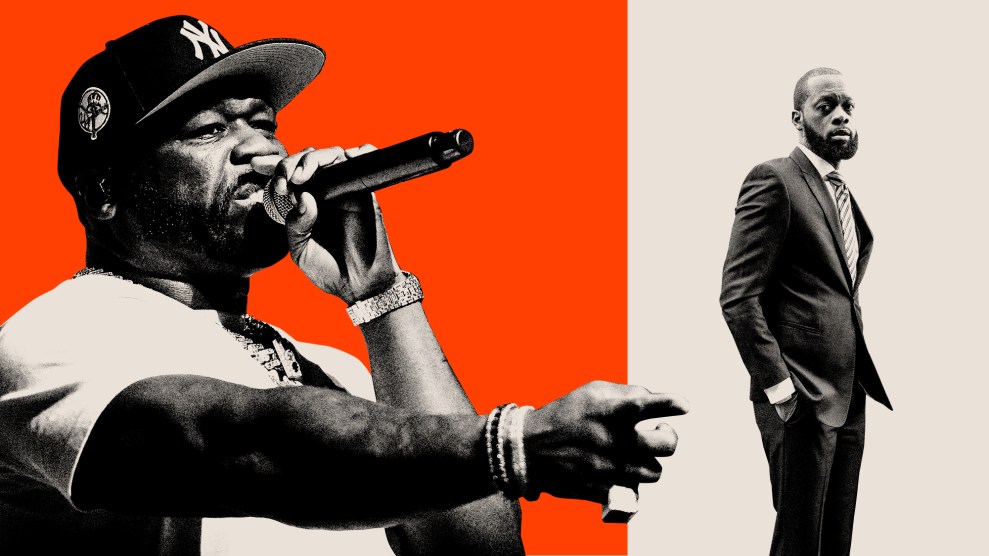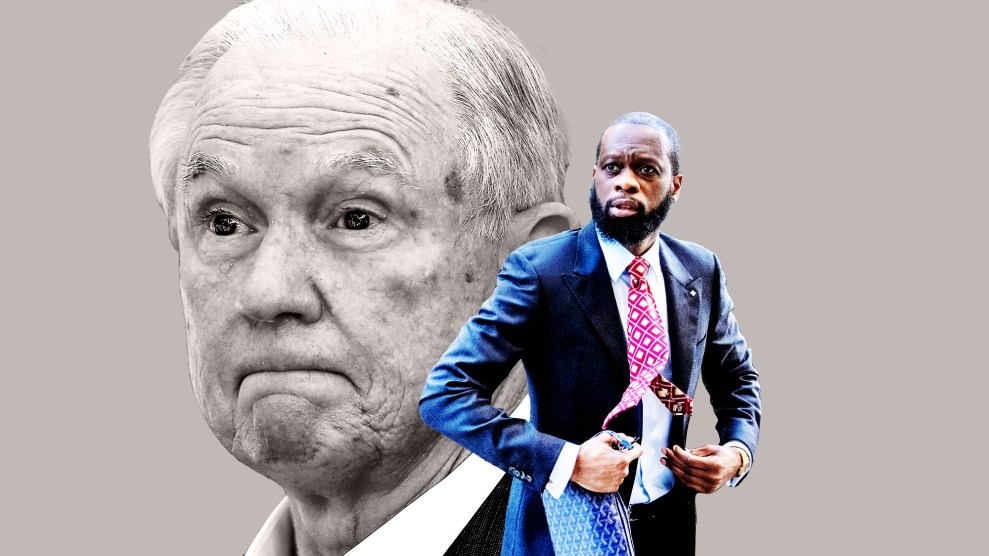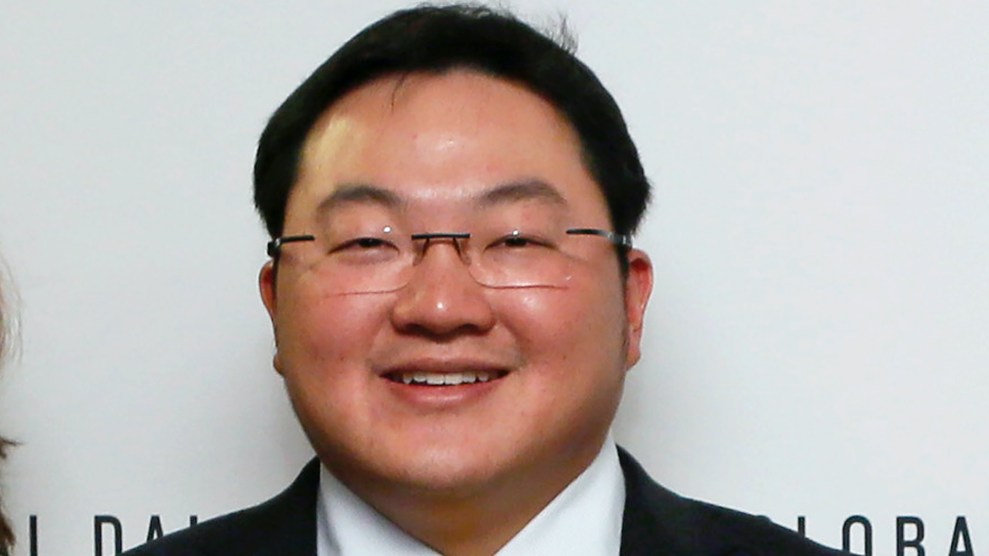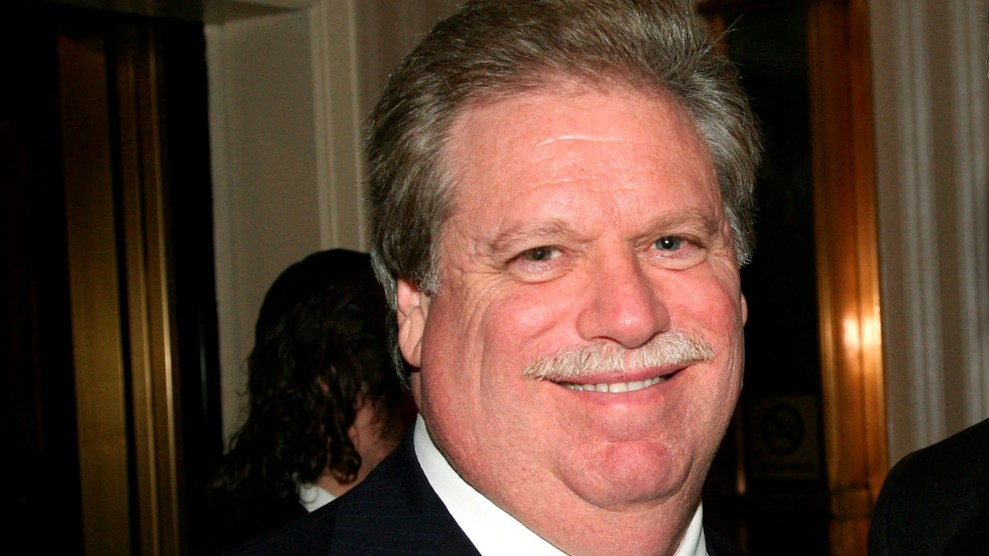
Mother Jones; Piero Cruciatti/Sipa USA/AP, Andrew Harnik/AP
Update, April 26: A jury convicted Pras Michel on Wednesday on all 10 criminal counts he faced, including unregistered foreign lobbying, witness tampering, money laundering, conspiracy, lying to banks, and making false claims in FEC filings.
On Monday, rapper 50 Cent attacked Pras Michel, a former member of the Fugees, for supposedly admitting to being an FBI informant while testifying in his own defense last week at his trial for breaking campaign finance and foreign lobbying laws.
“I knew this fool was a Rat!” the “In da Club” artist wrote on Instagram. “I’m glad I never fvck with this guy.”
View this post on Instagram
That reaction and various similar social media takes rely on several articles in hip hop publications that say Michel acknowledged that he had acted as an informal FBI informant in 2017. Those reports are all based on a single Rolling Stone story, which is itself aggregated from reporters present in the courtroom, including me. That article correctly notes that Michel testified that he voluntarily met with FBI agents in 2017 to discuss Guo Wengui, a reputed billionaire who fled China in 2014 and who the Chinese government wanted to have extradited to face various criminal charges, including fraud and rape. (Guo, who has since been indicted in the United States on separate charges, denies the allegations against him.)
“I took it upon myself to report because I thought the FBI should know,” Michel said on the stand. But Michel was not reporting the full story.
I watched Michel’s testimony and much of the trial, and I have covered the case since 2018. And I can assure 50 Cent and other Michel critics that he is not a snitch—at least not in the way they imply. He did not contact the FBI to report a Chinese scheme to win Guo’s extradition. He contacted the feds as part of that scheme.
Michel tried to help the Chinese government secure Guo’s return because he was being paid tens of millions of dollars to do that, according to prosecutors. Importantly, Pras did not tell the FBI agents he met with that he was being paid to help China. And he certainly was not there to help the feds. Instead, he wanted something from them. According to an FBI summary of the conversation reported last month by Bloomberg, the “Ghetto Superstar” artist “probed the interviewing agents,” trying to gain information about the bureau’s views on Guo to pass on to the Chinese.
Michel insisted on the stand that his financial dealings were “extremely complicated,” and a lot of the coverage of the case treats it as hopelessly complex. But it’s actually pretty simple. Michel and several coconspirators allegedly did a lot of stuff, much of it illegal, in exchange for massive sums of money from one guy: Malaysian financier and convicted money launderer Jho Taek Low.
A little over a decade ago, Low began showing up at clubs in New York and LA, spending attention-grabbing amounts of cash and cultivating celebrities like Michel, Leonardo DiCaprio, and Paris Hilton. Low claimed to be a successful businessman. He helped finance the Wolf of Wall Street, which DiCaprio starred in, and other Hollywood ventures. But the feds say he was actually laundering billions of dollars stolen by Malaysia’s former prime minister and associates from a state development fund called 1MDB.
In 2012, Low wanted access to the Obama campaign. And Michel in his testimony admitted that Low, a foreign national barred from donating to US candidates, gave him $20 million. Michel allegedly passed $800,000 of that on to the campaign, via straw donors, which allowed him to evade legal limits on donations. Michel denied that Low gave him the money to funnel to the Obama campaign and also claimed that he was not aware he was breaking the law. Still, he admitted to making illegal campaign donations.
By 2017, Low had a big legal problem. The Justice Department was investigating the 1MDB theft, along with Low’s role in it, and had frozen his assets. Low sought Michel’s help in finding a political operative with access to the Trump administration who could lobby for the DOJ to drop the investigation and unfreeze his assets. Through Michel—who tapped an entertainment industry friend with GOP fundraising ties, Nickie Lum Davis—Low hooked up with Elliott Broidy, who at the time was the Republican National Committee’s deputy finance chair. Broidy, after successfully demanding a $1 million payment just to meet with Low in Bangkok, set about lobbying Trump and other White House officials on Low’s behalf. Broidy attempted to set up a golf date where Malaysian Prime Minister Najib Razak, who has since been imprisoned in Malaysia for his role in the 1MDB scandal, could directly lobby Trump. Broidy also pushed the claim that the DOJ investigation was damaging US-Malaysian relations.
Low, who is currently a fugitive believed to be hiding in China, at the time was apparently also seeking help from Chinese authorities. To curry favor there, he introduced Michel, Davis, and Broidy to Sun Lijun, then China’s vice minister of public security, in a hotel in Shenzhen, China, in May 2017. Sun sought the group’s help getting Guo sent back to China.
Michel ultimately received, astonishingly, more than $100 million for his efforts to help Low and Sun. Michel kept about $74 million of that, until the DOJ seized it. Broidy and Davis, who both later pleaded guilty to illegal foreign lobbying charges, also received, and later forfeited, millions.
Michel’s meeting with FBI agents in June 2017 came on the heels of a secretive meeting he’d had with Sun at the Four Seasons hotel in Manhattan. And Michel allegedly presented the feds with information he’d gotten directly from Sun. He also passed on to Broidy Chinese talking points suggesting that Guo’s extradition would encourage China to return several American citizens imprisoned there. Broidy put those arguments in a memo he sent to Attorney General Jeff Sessions.
This is not snitching. It’s influence peddling. Pras Michel was no rat. He was a lobbyist.









